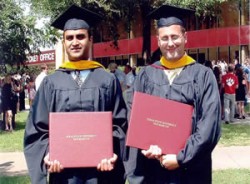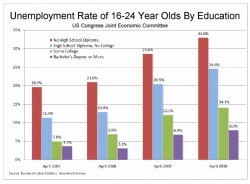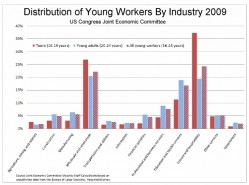 As the last strains of Pomp and Circumstance played out over college quads and athletic fields these last few weeks, more than a few of the new graduates had to be wondering: What next?
As the last strains of Pomp and Circumstance played out over college quads and athletic fields these last few weeks, more than a few of the new graduates had to be wondering: What next?
A survey of graduating seniors found only a quarter of those in the Class of 2010 who applied for a job had one waiting. Conducted by the National Association of Colleges and Employers, this year’s results, certainly discouraging if you’re one of the grads or a parent, are an improvement over 2009, when only 19.7 percent had jobs waiting.
The ever-so-slowly improving economy is one reason for the better numbers. Another is savvier job hunting. “A greater number of Class of 2010 graduates accepted the jobs they were offered,” says Marilyn Mackes, NACE executive director. Last year, 45 percent of the students offered jobs accepted them; this year the acceptance rate rose to 59 percent.
 Since the survey was conducted a couple months ago the numbers no doubt have improved. Still, the demand for recent college graduates mirrors the national economic picture. While the unemployment rate for those with bachelor degrees of all ages was 4.9 percent in April, the rate for those under 25 was 8 percent. Better than the national 9.9 percent, the unemployment rate for young degreed workers has been steadily rising. In April 2009 it was 6.8 percent and in April 2008 it was 3.1 percent.
Since the survey was conducted a couple months ago the numbers no doubt have improved. Still, the demand for recent college graduates mirrors the national economic picture. While the unemployment rate for those with bachelor degrees of all ages was 4.9 percent in April, the rate for those under 25 was 8 percent. Better than the national 9.9 percent, the unemployment rate for young degreed workers has been steadily rising. In April 2009 it was 6.8 percent and in April 2008 it was 3.1 percent.
Even the most prestigious schools report their graduates are having a difficult time finding work. Harvard, last year, said only 33 percent of its 2009 seniors had a job at graduation, down from 51 percent the year before. While this year’s numbers aren’t yet available, one sign of the times is the university’s launch in March of a jobs mailing list. In two days 1,000 students had signed up.
The NACE Job Outlook 2010 Spring Update projected college graduate hiring to be up 5.3 percent over 2009. Not a huge improvement, but better than last fall’s prediction by the Michigan State University 2009-2010 Recruiting Trends survey, which had recruiting flat for the college year.
Data like this, and the monthly U.S. Bureau of Labor Statistics reports showing that among all 20-24 year-olds the unemployment rate was 17.2 percent in April, has promoted concern from both industry and government.
The U.S. Congress Joint Economic Committee inventoried the plight of younger workers, saying that the 19.6 percent unemployment rate for workers 16-24 is the highest ever in the 63 years the data has been tracked. For those without a high school diploma, the unemployment rate is 33 percent.

Those who are working tend to be in industries hardest hit by the recession. The committee report notes that young workers make up 34 percent of the leisure and hospitality workforce and 20 percent of the wholesale and retail trades workforce. Nationally, workers under 25 comprise 13 percent of the entire labor force.
The biggest share of those workers are teenagers. Nevertheless, those 20-24 — where the young, college educated fall — still account for almost 20 percent of the workers in each of those two groups and close to that percentage in education and health services.
Northeastern University economics Professor Andrew Sum found that 51 percent of young graduates were working in jobs requiring a college degree. That’s a 13.6 percent decrease since 2000.
When they do find jobs in their field, it’s often at a reduced salary. A NACE survey found the average salary offer for grads with a B.A. is $47,673, a 1.7 percent decline from last year. Liberal arts majors took the biggest hit, with salary offers averaging $33,540, an 8.9 percent decline over last year. Grads with computer science degrees saw a 5.8 percent increase to $58,746.
The tough job market and declining first-year salaries are no doubt behind the increasing number of recent graduates moving back home. A survey by CollegeGrad.com found that 80 percent of the 2009 grads moved back. In 2006, only 67 percent did.
Several months ago Intel announced an Invest in America Alliance to funnel $3.5 billion to U.S. tech companies in all fields, including information and biotech, over the next two years. That will help spur hiring, especially for new college graduates in emerging fields and sciences. But in addition, the 17 partner firms in the alliance pledged to increase their hiring of graduating seniors to an estimated 10,500 this year alone.
The implications of the recession for newly minted graduates will extend into the future. Yale economist Lisa Kahn who has been following the impact of recessions on the careers of young workers found that for every one point increase in the national unemployment rate, starting salaries for new, white male graduates declined 7-8 percent. The effect persisted for years, she found. After 18 years of employment, those who graduated at the height of the recession in the 1980s earned, on average, 2 percent less than those who graduated into a more robust economy.